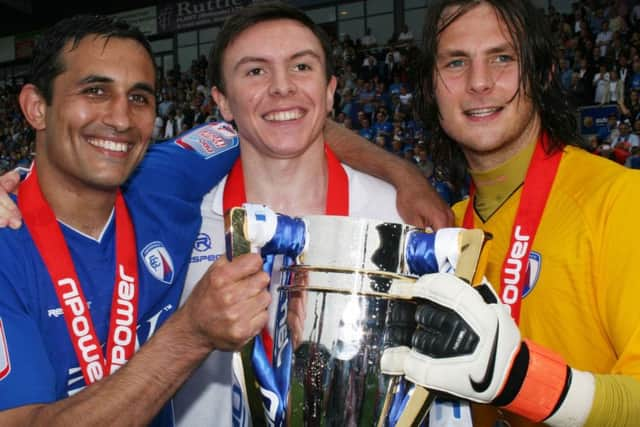Tommy Lee: Lester's passion for Forest coaching role is infectious


Jack Lester is one of those.
For every ounce of skill and technique he had, he had double that in desire.
He possessed a will to win that often tested the boundaries between fair and foul play and he was a person who demanded the very best from himself and his team-mates.


Advertisement
Hide AdAdvertisement
Hide AdArriving at Jack’s brand new Sheffield home to talk about his transition from player to coach, I was perhaps expecting retirement to have dampened the flame slightly. I couldn’t have been more wrong.
It’s been almost three years since the 40-year-old said his goodbyes to Chesterfield, netting a brace in his farewell appearance for the club, bringing to an end a Football League career spanning 19 years and 178 goals.
A brief spell at non-league Gateshead followed, culminating in a Conference Premier Play-off Final goal at Wembley but as is the life of a footballer, ‘Father Time’ had the last word.
Now in his second full season as Nottingham Forest’s youth team coach, he has already tasted success.


Advertisement
Hide AdAdvertisement
Hide AdLast month his under 18 side were crowned league champions but he acknowledges nurturing the next generation is his real aim.
He said: “We spoke about winning the league, which was an ambition. I think the players have loved it but it’s about development.
“We’ve had a couple of players form the under 18s in the first team this year and that’s a bigger achievement.”
Sat opposite me in his kitchen, wearing his black Forest training kit, he cuts the figure of a man who could still get you 20 goals a season but he knew exactly when his playing days were coming to an end.
Advertisement
Hide AdAdvertisement
Hide Ad“You get the sense the game is leaving you when you can’t get around the pitch like you could,” he said.
“It starts to dawn on you that you are going to be out of football. When something is coming to an end, you realise how much you love it.
“While I was playing at Gateshead, I sent my CV out to local clubs and Forest and a couple of others got in touch.
“Gary Brazil, who was the head of the academy, gave me an interview. I spoke with him for an hour and he offered me the job.”
Advertisement
Hide AdAdvertisement
Hide AdMaking the transition from player to coach can often prove to be a difficult one but it is one Jack has relished.
The melancholy you might expect from talking to a player coming to terms with no longer being able to play the game isn’t there.
On the contrary, instead there is an eagerness for his new career that’s infectious.
“I have loved it,” he said. “Because you’re out on the grass every day, you don’t miss playing. It’s almost more exciting because you’re controlling everything.
Advertisement
Hide AdAdvertisement
Hide Ad“It’s not better than playing but you’re picking teams, picking formations, working out set-pieces and you’re working out tactically, how you want to play.”
But every now and again, the desire to be out on that field to “sort things out” still simmers to the surface.
“What I find frustrating is when it’s a real game, with a bit of needle,” he admitted. “When it gets really competitive on the pitch, that’s the time you think ‘God I wish I was out there’ because they’re the games you love.”
When I asked him if the responsibility of developing young footballers had made him reflect on his own playing days differently, his answer was emphatic.
Advertisement
Hide AdAdvertisement
Hide Ad“Massively. I realised, at times, I might’ve been difficult to manage. I realised why mangers might’ve valued me. I’ve noticed myself as a younger player and the things I didn’t get right. Towards the end of my career, I realised I would start to progress when I looked at myself when things weren’t going right.”
It’s an attribute he is keen to impress on his young charges.
“You try and educate the players on that. A real skill for a young player is when they can look at themselves and adjust.
“The game is changing and managers, players and philosophies are changing. If they can adjust to that, they will flourish.
Advertisement
Hide AdAdvertisement
Hide Ad“We are trying to create leaders and decision makers. If you can create a top leader, you’ll create a top player.”
So what is the ultimate ambition for a man who is clearly embracing life on the other side of the white wash?
“A lot of people when they finish playing go in to the under 18s and it’s a stepping stone for first team stuff, but I have loved development because you are actually having an influence on people’s careers.
“If you’re passionate about it, you’re trying to sell your passion for the game and you want the players to love the game. When you can see that passion ignite in them, it’s a wonderful feeling.”
Advertisement
Hide AdAdvertisement
Hide AdHe paused: “What comes next? I don’t know but I want to stay in the game until I’m an old man.”
There’s absolutely no doubt that when Jack Lester called time on his career, football lost a talented player.
But our sport might just have gained an even better coach.